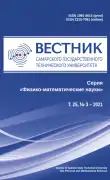Глобализация анализа моделей размещения частиц по ячейкам
- Авторы: Энатская Н.Ю.1
-
Учреждения:
- Национальный исследовательский университет «Высшая школа экономики», Московский институт электроники и математики им. А. Н. Тихонова
- Выпуск: Том 25, № 3 (2021)
- Страницы: 571-587
- Раздел: Математическое моделирование, численные методы и комплексы программ
- URL: https://bakhtiniada.ru/1991-8615/article/view/64132
- DOI: https://doi.org/10.14498/vsgtu1857
- ID: 64132
Цитировать
Полный текст
Аннотация
Рассматривается общий подход к доасимптотическому анализу схем с разными качествами во всех сочетаниях по их различимости составляющих их элементов (ячеек и частиц). Для этого в каждой группе таких схем с общими ограничениями вместо непосредственного их изучения на основе учета специфики каждой схемы предлагается некоторый общий набор алгоритмических процедур пересчета результатов их доасимптотического анализа в схеме начиная со схемы с наибольшей дифференциацией их исходов последовательно для остальных схем группы с различиями в качестве одного элемента. Анализ каждой схемы проводится по традиционным и по ряду следующих новых направлений: построение случайного процесса формирования и нумерованного бесповторного перечисления исходов схемы в порядке их получения; нахождение числа исходов схемы; решение задачи нумерации для исходов схемы, состоящей в установлении взаимно однозначного соответствия между их видами и номерами; задание их вероятностного распределения и моделирования исходов схемы с этим вероятностным распределением.
В частности, отдельно изучаются случаи групп схем без ограничений размещения частиц и с ограничением (не более одной частицы в ячейке), приводящие к некоторым известным аналитическим результатам. При любых ограничениях в рассматриваемой группе схем их анализ проводится путем реализации алгоритмических процедур последовательного преобразования результатов анализа одной схемы группы для другой. Объединения в такие пары схем производятся по признаку различия качества одного их элемента.
Ключевые слова
Об авторах
Наталия Юрьевна Энатская
Национальный исследовательский университет «Высшая школа экономики», Московский институт электроники и математики им. А. Н. Тихонова
Автор, ответственный за переписку.
Email: nat1943@mail.ru
ORCID iD: 0000-0003-1241-7543
SPIN-код: 9706-9900
Scopus Author ID: 6504731611
ResearcherId: L-6102-2015
http://www.mathnet.ru/person28100
кандидат физико-математических наук, доцент; доцент; деп. прикладной математики
Россия, 123458, Москва, ул. Таллинская, 34Список литературы
- Виленкин Н. Я. Комбинаторика. М.: Наука, 1969. 328 с.
- Riordan J. An Introduction to Combinatorial Analysis / Wiley Publicatlon in Mathematical Statistics. New York: John Wiley and Sons, 1958. x+244 pp.
- Сачков В. Н. Введение в комбинаторные методы дискретной математики. М.: Наука, 1982. 384 с.
- Сачков В. Н. Вероятностные методы в комбинаторном анализе. М.: Наука, 1978. 320 с.
- Hall M. Combinatorial Theory / Wiley Classics Library. John Wiley and Sons, 1998. xviii+440 pp.
- Ryser H. J. Combinatorial Mathematics / The Carus Mathematical Monographs. vol. 14. New York: John Wiley and Sons, 1963. xiv+154 pp.
- Рыбников К. А. Введение в комбинаторный анализ. М.: МГУ, 1985. 312 с.
- Колчин В. Ф. Севастьянов Б. А., Чистяков В. П. Случайные размещения / Теория вероятностей и математическая статистика. Москва: Наука, 1976. 223 с.
- Goulden I. P. Jackon D. M. Combinatorial Enumeration. Mineola, NY: Dover Publ., 2004. xxvi+569 pp.
- Энатская Н. Ю. Вероятностные модели комбинаторных схем // Вестн. ЮУрГУ. Сер. Матем. моделирование и программирование, 2020. Т. 13, № 3. С. 103–111. https://doi.org/10.14529/mmp200312
- Энатская Н. Ю. Анализ комбинаторных схем в доасимптотической области изменения параметров // Труды Карельского научного центра РАН, 2018. № 7. С. 117–133. https://doi.org/10.17076/mat750
- Энатская Н. Ю. Комбинаторный анализ схемы размещения различимых частиц по различимым ячейкам без пустых ячеек // Труды Карельского научного центра РАН, 2020. № 7. С. 120–126. https://doi.org/10.17076/mat1172
Дополнительные файлы






